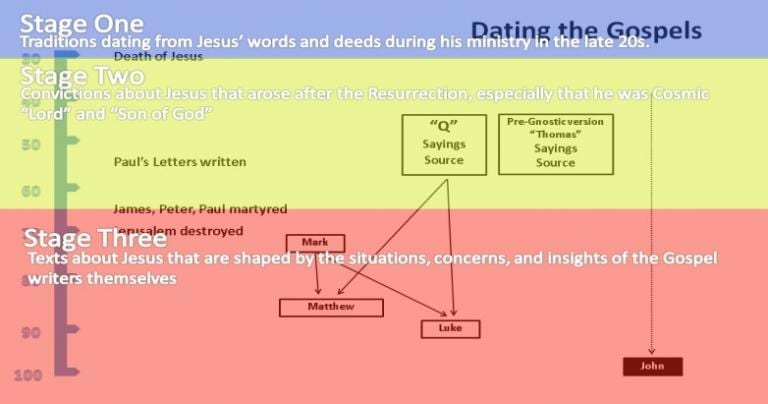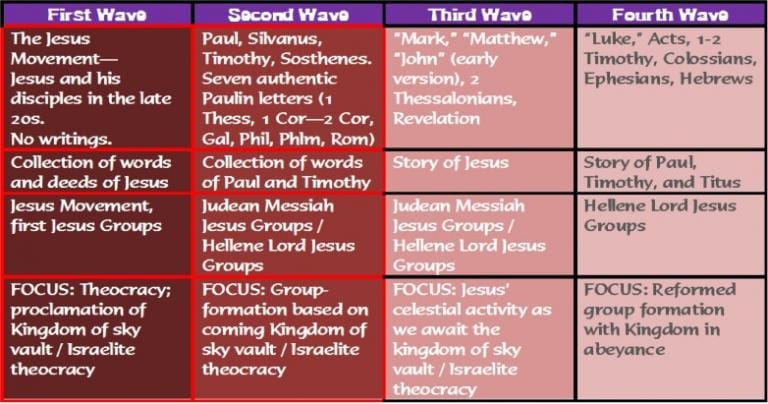
More contradictions and disagreements exist within the Gospels that Catholics and other Christians should not fear to acknowledge and explore.
More contradictions and disagreements in the Bible!? Are you saying the Word of God is not true? Are you saying it is not reliable? Why are you always disparaging the faith and the Holy Bible?
Above is a typical reaction from would be defenders of the faith. Lots of Catholic biblical fundamentalists these days pretend they are apologists doing apologetics. They wince at blogs like this one, deeming it antithetical to the Catholic faith, or even dangerous.
Getting More Real
Genuine apologetics is something else. Apologetics is that branch of theology that offers a reasonable defense of the faith, and shows that it is not absurd to believe and practice what we Christians do. What these jokers and popular authors do is anything but apologetics, usually by way of “proving” our tradition as the right, the pure, the good, and the only, meanwhile “disproving” and demonizing other faith traditions. Their work is an insult to the true exercise of apologetics.
So yeah they go crazy when people like me easily show that our Sacred Scriptures abound with contradictions and disagreements about many things. It’s a shield and a cloak to hide fear. But they ought not be afraid. The Bible isn’t inerrant in the way they think.
More Salvific, Less Cognitive
“Well then, I guess then you aren’t much of a Christian, huh? If you don’t believe the inerrant and inspired Bible is all reliable, and all in unison, then that means you can’t believe in Inspiration!”
Not true. All of Scripture is not “in unison” of portraying many things, including Mary and Joseph, as we have seen on this blog. Inspiration doesn’t work that way. If there is any inerrancy to Scripture, it’s salvific inerrancy, not cognitive. It doesn’t all agree. And it doesn’t have to, either. Because truth is greater than factual truth and everything “lining up” in perfect, fact-precise consistency.
We just saw more Gospel contradictions and disagreement examining how Mary is depicted between different Gospels. According to “Mark,” Mary and the biological relations come to Jesus to drag him away because he was crazy. They want to prevent his mission (Mark 3:20–22, 31-35; cf. 8:31-33)! But in stark contrast, according to “Luke,” Mary and the relatives wish to join him and his ministry (Luke 8:19-21). That’s a major disagreement. I can list many, many more!
More Context with Inerrancy and Reliability
But the Bible is inerrant! The Bible must be absolutely reliable! Because it is God’s Word it cannot err! Can God make mistakes? No way! So that means God’s written Word cannot make mistakes either! It cannot have contradictions!
This is a very big misunderstanding prevalent among many popular Catholic speakers and an alarming horde of storm troopers for “orthodoxy.” The truth is that if the Bible has any inerrancy whatsoever, it must be a salvific inerrancy. Inerrancy is not cognitive, like they demand it be, but salvific. Scripture all together, all of the writings—IN ALL THE MESSINESS OF GENOCIDE, SLAVERY, SUBJUGATION OF WOMEN, EVERYTHING!!—is salvifically inerrant. God communicates God’s own self through all this human messiness. In all that is written down in our sacred library called the Bible, we can find the truth of Scripture which is salvation-truth (“for the sake of our salvation”), not cognitive.
Reliable? What is the context? Reliable as a science text? In how to deal with pandemics? Negotiating treaties avoiding nuclear war? In have a proper modern marriage between self-selecting partners? What’s the scope of “reliable”?
Seeing the Messiness of Contradictions More
More inconsistencies can be demonstrated in how the sayings of Jesus mutate over time, as seen in how different Evangelists treat them, augment them, and edit them. They change and are not just given from “different angles,” but really differ.
More to it, we know enough about the historical Jesus to say confidently that he did not tell allegories, but rather parables. But the Gospel writers, by the time they wrote them down decades after, had turned them into allegories. The scholarly “Criterion of Tendencies in the Developing Tradition” shows that these allegorical augmentations and explanations of the Gospel parables cannot be on Stage/Level One of Gospel Formation (e.g., compare Mark 4:13-20 // Matthew 13:36-43).
More Contradictions = More Questions
For the sake of more clarity, here are some questions courtesy of the “New Revised and Expanded Edition” of “A Christological Catechism: New Testament Answers,” by the late biblical scholar Joseph A. Fitzmyer, S.J.—
1. How many times did Jesus go up to Jerusalem during his ministry?
Was it only one time (Matthew, Mark, and Luke), or several times (John)? The Gospels disagree.
2. When did Jesus die in relation to Passover?
Were you there when they crucified my Lord? You were? Well then, tell me exactly when it happened! Was Jesus crucified at 9:00 am on the Day of Passover itself, to languish for about six hours and die at about 3:00 pm that afternoon (Synoptics)? Or was King Jesus, in absolute control, lifted up at noon on the Day of Preparation, just as the lambs were being slaughtered for the yet-to-happen Passover (John 19:14, 31, 42)? The Gospels disagree.Even God can’t pull off having the same Jesus die on two different days!
3. How long did the Jesus Movement last?
Was it only one year long (one dry season, as the Synoptics tell us)? Or did it take around three annual Passovers (hence three dry seasons, as we learn in John 2:13; 6:4; 11:55)? Less or more? One year or three? The Gospels disagree.
4. Who was John the Dipping-prophet really?
Wasn’t he “Elijah” who preached metanoia (as the Synoptics tell us)? Or was he rather “ouk eimi”—“AM NOT!”—and therefore NOT Elijah, but instead a “witness” to Jesus, the Cosmic Ram (John 1:19-36)?
John cannot be both Elijah and NOT-Elijah, folks.
5. And when exactly did Jesus start his ministry up?
Did Jesus begin it after John got arrested (what the Synoptics say, Mark 9:9-13)? Or did John’s ministry overlap his (as “John” writes, 3:22-30)? More contradictions and disagreements!
6. And who were the first to join Jesus in his faction and Movement?
Were they two pairs of Galilean fishing brothers (Simon & Andrew, James & John, as the Synoptics say)? Or were the first five disciples first, Andrew; second, an anonymous one (really Lazarus, see John 1:35-40; 11:3-5; 13:23-25; 18:15-16; 19:25-27; 20:2-10; 21:7; 21:20-24); third, Simon Peter; fourth, Philip; and fifth, Nathanael (John 1:35-51)?
More Gospel disagreements.
7. How many marvels did Jesus perform?
Did he work many “wonders” but speak pithy sayings and tell lots of parables (like the Synoptics suggest)? Or did Jesus only perform seven “signs” and give several longwinded monologues (or dialogues that turn into monologues) but never parables (as “John” depicts)?
There is a huge difference between how the Synoptic Jesus and the Johannine Jesus in how they speak.
The Gospels disagree!
8. Who are the followers of Jesus commanded to “love” anyway?
Did Jesus command them to “love your neighbors” and “Love your enemies” (in agreement with the Synoptics, Mark 12:31 and Matthew 5:43-44)? Or did he rather command them to “love one another” (John 13:34-35; 15:12, 17; notice that the focus lies WITH INSIDERS of the Jesus group)? Big Gospel disagreement on focus there.
9. Just how important was Peter, anyway?
Certainly he was the first and most prominent of the “Twelve” (as the Synoptics depict him, Matthew 16:13-19). Or were other followers of Jesus more important than Peter? Was it that Peter was a bumbling disciple who just doesn’t get it? Were Mary Magdalene, Martha of Bethany, and the “Beloved Disciple” Lazarus all much more prominent as “disciples” of Jesus (John 1—20, excluding the appended chapter 21)?
Huge Gospel disagreement!
10. What was the thrust and focus of Jesus’ healing and teaching?
Was Jesus’ focused on the forthcoming Israelite Theocracy (i.e., the “Kingdom of God,” as in the Synoptics)? Or did he focus on “eternal life” realized right now in the Johannine antisociety (John 3:36; 5:24; 6:47-54) meanwhile dropping all care for Theocracy? What a disagreement and contradiction, that!
11. Who were the real enemies of Jesus?
Were they the Sadducees and the Herodians and other Urban Elites (as the Synoptics tell us)? Or were they a larger, more all-encompassing body, indeed the whole dominant society of first century Israelites (“the Judaeans,” always wrongly translated as “Jews”) called in Johannine antilanguage “the World” who rejects him and his followers?
The Gospels disagree.
12. Why exactly do Jesus’ enemies plot to try to destroy or kill him?
Was it for various reasons (Synoptics)? Or was it because they claimed Jesus had blasphemed (John 8:59; 10:31-33; cf. 11:8)?
And what ultimately got Jesus killed? Was it his prophetic sign action in the Temple humiliating the Jerusalem elites that earned him a death sentence (Synoptics)? Or was it his raising Lazarus from the dead (John 11:45-53)?
The Gospels disagree.
13. When was that Temple fracas?
When did that happen, precisely? Did Jesus pull off that stunt just one week prior to his death (Synoptics)? Or did it happen at the beginning of the Jesus Movement (John 2:13-22) with at least two years more of adventures before Jesus’ died?
The Gospels disagree.
14. Who anointed Jesus at Bethany?
Did some anonymous woman do this, and did anonymous people object to it (as the Synoptics portray it)? Or did Mary, sister of Lazarus, perform this anointing, only to be rebuked by Judas Iscariot (John 12:1-8)?
The Gospels disagree.
15. When was the Last Supper?
On what day did Jesus’ farewell dinner fall? Was it on Thursday Eve of Passover, and therefore the beginning of the feast so that the Last Supper was a Passover meal (Synoptics)? Or did this farewell dinner occur before Passover had begun, and therefore not a Passover meal (John 13:1; 18:28)?
The Gospels disagree.
16. Where was Jesus arrested?
Didn’t Judas betray a very weakened and human Jesus (Mark 14:32-42) through Judas’ kiss in “Gethsemane” (as the Synoptics say)? Or was in it some unnamed “garden” in the Kidron Valley where a powerful, completely in control godlike Jesus identifies himself (John 18:1-11)?
The Gospels disagree.
18. Who anointed and prepared the dead body of Jesus, and how?
Didn’t certain women prepare spices to anoint Jesus’ body after he was buried (Synoptics)? Or was it elites, Joseph of Arimathea and Nicodemus, who prepared Jesus’ body for a royal funeral (John 19:38-42)? The Gospels disagree.
More Problems for Fundamentalists
And I can illustrate even more disagreements among the Synoptic Gospels. Look here at more contradictions and obvious editorial changes within the Synoptic tradition itself:
Mark 6:4
Jesus said to them,
“A prophet is not without honor except in his native place
and AMONG HIS OWN KIN and IN HIS OWN HOUSE.”
Synoptic Parallels:
Matthew 13:57
Jesus said to them, ”
A prophet is not without honor except in his native place
and IN HIS OWN HOUSE.”
Luke 4:24
And [Jesus] said,
“Amen, I say to you,
no prophet is accepted in his own native place.”
Where did those changes originate? They got determined by ongoing changes within various Jesus groups recontextualizing these traditions decades after-the-fact and in different situations and in different Mediterranean locations.


Inspired and Inerrant = More than Fundamentalist Understandings
“Inspired” does not mean God dictated it, fellow Christians. The Bible is not the wordS (plural) of God. Instead, the Bible is God’s human Word. It is God’s Word in many human words. It’s messy.
Is the Bible a playbook for life in 21st century America? Is it a book of answers? No my friends. Instead, as mystics tell us, the Bible is a library of conflicts rather than answers. Both inspiration and incarnation are beautifully messy. We humans need the messiness of inspiration.
More than Meets the Eye to Scripture
Don’t be like these so-called apologists. They’ve done a lot of damage. Don’t make Scripture pretty, always wiping up the messiness. Never dismiss or ignore the Bible’s conflicts, dilemmas, paradoxes, inconsistencies, and contradictions. We must grapple with the Sacred Page. We are called to throw our Bibles across the room sometimes, and not pick it back up for a good while as we fume or quake in disturbance—yes, even such a sacrilege can be holy.
Grapple my friends. You have to grapple with God’s human Word, even as Jacob is said to have grappled with God. If you read the Scriptures honestly, you can forget about getting answers—you will be getting problems! And blessed are you!
With a touch of Anthony de Mello and Richard Rohr, allow the salvifically true the Bible baffle you. As these wise mystics show, the Scriptures mirror you, show you yourself and your false gods. But should you risk much, it will disclose your true self and the true God.












